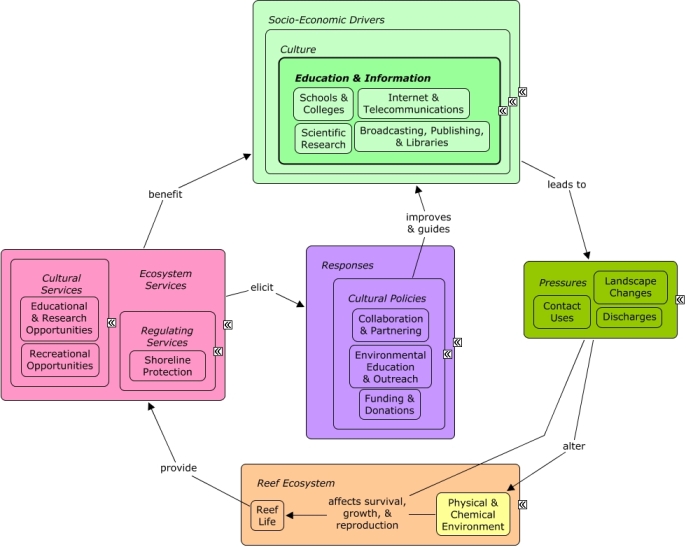ReefLink Database

Schools & Colleges
Schools and Colleges sectors consist of institutions whose primary purpose is to educate students, including secondary schools, universities, and trade schools.
CMap

CMap Description
Growing coastal development changes the cultural identity of a community, creating an increased need for education and information. Infrastructure is needed to support the Education and Information sectors, including buildings and roads, and this infrastructure results in landscape changes and discharges. Information sectors may benefit from aesthetic value provided by reefs, including photography and video. Coastal schools & colleges may also directly benefit from shoreline protection. Reef ecosystems also provide educational and research opportunities for students and scientific researchers. Scientific research can contribute to the effectiveness of decisions by enhancing our understanding of ecosystems. Collaboration and funding can improve, increase, and guide scientific research. Decision-makers may also utilize schools & colleges to improve environmental education.Citations
| Citation | Year | Study Location | Study Type | Database Topics |
|---|---|---|---|---|
| Puebla, O; Bermingham, E; Guichard, F. 2011. Perspective: Matching, Mate Choice, and Speciation. Integrative And Comparative Biology 51:485-491. | 2011 | South & Central America; Caribbean | Model | Fish; Medical Centers; Schools & Colleges |
| Sutherland, WJ; Bardsley, S; Bennun, L; Clout, M; Cote, IM; Depledge, MH; Dicks, LV; Dobson, AP; Fellman, L; Fleishman, E; Gibbons, DW; Impey, AJ; Lawton, JH; Lickorish, F; Lindenmayer, DB; Lovejoy, TE; Mac Nally, R; Madgwick, J; Peck, LS; Pretty, J; Prio. 2011. Horizon scan of global conservation issues for 2011. Trends in Ecology and Evolution 26:10-16. | 2011 | Global | Review | Greenhouse Gas Emissions; Invasive Species; Pathogens; Schools & Colleges |
| 2010. MS4 Permit Improvement Guide. 833-R-10-001, US Environmental Protection Agency Office of Water. | 2010 | Discharge Limitations; Discharges; Non-point Source Runoff; Schools & Colleges; Special Use Permitting; Surface & Groundwater Flow | ||
| Church, R. A., D. J. Warren, and J. B. Irion. 2009. Analysis of Deepwater Shipwrecks in the Gulf of Mexico: Artificial Reef Effect of Six World War II Shipwrecks. Oceanography 22:50-63. | 2009 | South & Central America; Mexico | Field Study & Monitoring | Artificial Habitat; Collaboration & Partnering; Invertebrates; Marine Vertebrates; Schools & Colleges; Water Depth & Sea Level |
| Parker, B. A., T. R. L. Christensen, S. F. Heron, J. A. Morgan, and C. M. Eakin. 2009. A Classroom Activity Using Satellite Sea Surface Temperatures to Predict Coral Bleaching. Oceanography 22:252-257. | 2009 | Schools & Colleges | ||
| Roseman, E. F., J. S. Schaeffer, and P. J. Steen. 2009. Review of fish diversity in the Lake Huron basin. Comparative Biochemistry and Physiology Part A 12:22-Nov. | 2009 | Review | Climate; Fish; Fishing Sector; Remediation; Schools & Colleges; Surface & Groundwater Flow | |
| D'Entremont, A., J. Kaariainen, and K. Baker. 2008. SERPENT of the Deep - Research, monitoring and partnerships for a deepwater well off atlantic canada. Pages 1493-1500 in Society of Petroleum Engineers - 9th International Conference on Health, Safety and Environment in Oil and Gas Exploration and Production 2008 - \In Search of Sustainable Excellence\"". | 2008 | US East Coast (NC, SC, GA) | Field Study & Monitoring; GIS & Maps | Collaboration & Partnering; Environmental Monitoring, Mapping, & Scientific Research; Fishing Sector; Oil & Gas Research & Exploration; Schools & Colleges; Substrate; Water Depth & Sea Level |
| Fisher, J. B., R. Nawaz, R. Fauzi, F. Nawaz, E. S. Said Md. Sadek, Z. Abd. Latif, and M. Blackett. 2008. Balancing water, religion and tourism on Redang Island, Malaysia. Environmental Research Letters 3:1-6. | 2008 | Malaysia | Collaboration & Partnering; Finfish Harvest; Fish; Hotel & Food Services; Marine Protected Areas; Schools & Colleges; Tourism & Recreation | |
| Jimenez-Badillo, L. 2008. Management challenges of small-scale fishing communities in a protected reef system of Veracruz, Gulf of Mexico. Fisheries Management and Ecology 15:19-26. | 2008 | South & Central America; Mexico | Aquaculture; Finfish Harvest; Fishing Sector; Schools & Colleges; Wholesale & Retail Trade | |
| Hwang, S. 2007. Page 111 in SEVENTH CARIBBEAN ISLANDS WATER RESOURCES CONGRESS. St. Croix, USVI. | 2007 | Global; South & Central America; Caribbean | Review; Field Study & Monitoring | Drinking Water Supply; Infrastructural Policies; Infrastructure; Landscape Conservation & Restoration; Schools & Colleges; Storms & Hurricanes; Surface & Groundwater Flow; Waste Management Policies; Wastewater Discharge |
| Moravchik, B. 2007. Comprehensive online tools for classroom teachers on coral reef ecosystems. Earth System Monitor 15:6. | 2007 | Decision Support Frameworks & Tools | Internet & Telecommunications; Schools & Colleges | |
| National Oceanic and Atmospheric Administration. 2007. National Artificial Reef Plan: Guidelines for Siting, Construction, Development, and Assessment of Artificial Reefs. US Department of Commerce. | 2007 | Field Study & Monitoring; Decision Support Frameworks & Tools | Artificial Habitat; Banks, Credit, & Securities; Biological Monitoring, Mapping, & Scientific Research; Construction Codes & Projects; Environmental Monitoring, Mapping, & Scientific Research; Finfish Harvest; Fish; Fishing & Harvesting Management; Fishing Sector; Military; Mitigation; Schools & Colleges | |
| Garrison, V. H., W. T. Foreman, S. Genualdi, D. W. Griffin, C. A. Kellogg, M. S. Majewski, A. Mohammed, A. Ramsubhag, E. A. Shinn, S. L. Simonich, and G. W. Smith. 2006. Saharan dust - A carrier of persistent organic pollutants, metals and microbes to the Caribbean? Revista de Biologia Tropical 54:21-Sep. | 2006 | South & Central America; US Virgin Islands; US East Coast (NC, SC, GA); Trinidad; Tobago; Caribbean | Fertilizer & Pesticide Use; Microorganisms; Pathogens; Schools & Colleges | |
| Armstrong, H. G. 2005. Environmental education in Tobago's primary schools: A case study of coral reef education. Revista de Biologia Tropical 53:229-238. | 2005 | Trinidad; Tobago | Field Study & Monitoring; Decision Support Frameworks & Tools | Environmental Education & Outreach; Schools & Colleges |
| Rohmann, S. and M. Monaco, editors. 2005. Mapping Southern Florida�s Shallow-water Coral Ecosystems: An Implementation Plan. NOAA Coral Reef Conservation Program, Silver Spring, (Maryland, USA). | 2005 | Florida | GIS & Maps | Funding & Donations; Funding & Incentives; Schools & Colleges |
| Taban, F., E. Acar, I. Fidan, and A. Zora. 2005. Teaching basic engineering concepts in a K-12 environment using LEGO bricks and robotics. Pages 13727-13736 in ASEE Annual Conference and Exposition, Conference Proceedings. | 2005 | Decision Support Frameworks & Tools | Collaboration & Partnering; Pipelines; Schools & Colleges; Storms & Hurricanes | |
| Legros, E. J. 2003. Exploration-Production. The day when peak production will come... [Exploration-Production. Le jour où le pic viendra...]. Pages 57-59 in Petrole et Gaz Informations. | 2003 | Global; Middle East; Saudi Arabia; Iran; Oman; Europe | Schools & Colleges | |
| Torres, A. 2003. Explorer cousteau to add an ocean perspective to WEFTEC.03. Water Environment and Technology 15:84-86. | 2003 | Schools & Colleges; Wetlands | ||
| Rodriguez-Martinez, R. and L. M. Ortiz. 1999. Coral reef education in schools of Quintana Roo, Mexico. Ocean and Coastal Management 42:1061-1068. | 1999 | South & Central America; Mexico | Decision Support Frameworks & Tools | Marine Protected Areas; Schools & Colleges |
| Miall, A. D. 1998. Canada's distinguished record of sedimentary geology. Geoscience Canada 25:97-114. | 1998 | Field Study & Monitoring; Model | Schools & Colleges; Sediment | |
| Rinkevich, B. and S. Shafir. 1998. Ex situ culture of colonial marine ornamental invertebrates: Concepts for domestication. Aquarium Sciences and Conservation 2:237-250. | 1998 | Field Study & Monitoring | Aquarium & Pet Trade; Aquarium Stock; Schools & Colleges; Tunicates | |
| Wood Mark, A., W. Miller James, IA N Koblick, and NE IL Monney. 1984. Marine Resources Classroom/Laboratory - Underwater Classroom Of Tomorrow. Pages 535-538 in Oceans Conference Record (IEEE). | 1984 | Lab Study | Schools & Colleges | |
| El Shareef, A. R. 1980. Studies in the geography of Saudi Arabia ' Farasan Islands'. Journal - College of Arts, University of Riyadh 7:25-Jan. | 1980 | Saudi Arabia | Schools & Colleges |
Management Options
| Management Option | Description | Sources | Database Topics |
|---|---|---|---|
| Administrative & Interagency Policy: Provide Policy Information to the Public | Communicate valid and emerging resource concerns to the general public. This can be accomplished through (#106), (#), or (#). | NOAA Marine Sanctuary Program. 2007. Florida Keys National Marine Sanctuary revised management plan. National Ocean Service, Key West, FL. |
Broadcasting, Publishing, & Libraries; Cultural Policies; Culture; Education & Information; Environmental Education & Outreach; Infrastructure; Internet & Telecommunications; Responses; Schools & Colleges; Scientific Research; Sectors Filling Human Needs; Socio-Economic Drivers; Utilities |
| Environmental Education: Support Environmental Workshops for Educators | This management option involves using environmental education workshops in order to ameliorate educator�s knowledge of the importance of corals because of their cultural and natural resource value. Local management areas can co-sponsor these efforts, and up-to-date information will always be utilized. Involvement in such workshops not only promotes coral education, but can also show educators where resources and opportunities exist through institutional collaboration. | NOAA Marine Sanctuary Program. 2007. Florida Keys National Marine Sanctuary revised management plan. National Ocean Service, Key West, FL. |
Collaboration & Partnering; Cultural Policies; Education & Information; Educational & Research Opportunities; Environmental Education & Outreach; Schools & Colleges; Security & Public Administration Policies |
| Environmental Education: Promote Environmental Education in Local Schools | Volunteers can be used to assist education and outreach staff to bring environmental education to local schools. Volunteers can do things such as: chaperone during snorkel trips, and help students with water quality testing exercises. Volunteers should be trained to correctly use educational materials and equipment. | NOAA Marine Sanctuary Program. 2007. Florida Keys National Marine Sanctuary revised management plan. National Ocean Service, Key West, FL. |
Collaboration & Partnering; Education & Information; Educational & Research Opportunities; Environmental Education & Outreach; Schools & Colleges; Security & Public Administration Policies |
| Environmental Education: Competitive Educational Funding Opportunities | This response involves offering funding to teachers for field trips, scientific equipment, and reference material in support of curricula. Teachers may submit proposals for evaluation, and funding is administered on a competitive basis from a non-profit organization or a reef management area. | NOAA Marine Sanctuary Program. 2007. Florida Keys National Marine Sanctuary revised management plan. National Ocean Service, Key West, FL. |
Collaboration & Partnering; Cultural Policies; Cultural Services; Education & Information; Educational & Research Opportunities; Environmental Education & Outreach; Funding & Incentives; Schools & Colleges; Security & Public Administration Policies |
| Monitor & Research: Develop Scientific Research Study Program | Management areas can encourage scientific studies by coordinating efforts of research groups and institutions. Collaboration and integration of these scientific studies can be beneficial to both the research groups and the management area. For example, data from monitoring of restoration projects could be analyzed by an academic institution, helping to reduce the burden on funds and perhaps using data in ways outside the scope of management objectives. | NOAA Marine Sanctuary Program. 2007. Florida Keys National Marine Sanctuary revised management plan. National Ocean Service, Key West, FL. |
Biological Monitoring & Restoration; Biological Monitoring, Mapping, & Scientific Research; Biomedical Research Policies; Collaboration & Partnering; Cultural Policies; Cultural Services; Decision Support; Ecosystem Monitoring & Restoration; Ecosystem Services; Education & Information; Educational & Research Opportunities; Environmental Education & Outreach; Environmental Monitoring & Restoration; Environmental Monitoring, Mapping, & Scientific Research; Resource Use Management; Schools & Colleges; Scientific Research; Security & Public Administration Policies; Special Use Permitting |
Laws
| Legal Citation | Purpose of Law | Management Organization | Database Topics |
|---|
